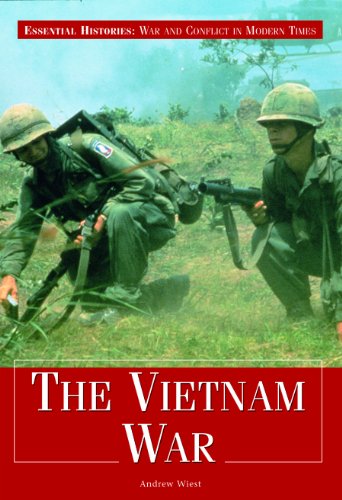-
The Korean War
Carter Malkasian
Paperback (Osprey Publishing, Sept. 25, 2001)The Korean War was a significant turning point in the Cold War. This book explains how the conflict in a small peninsula in East Asia had a tremendous impact on the entire international system and the balance of power between the two superpowers, America and Russia. Through the conflict, the West demonstrated its resolve to thwart Communist aggression and the armed forces of China, the Soviet Union and the United States came into direct combat for the only time during the Cold War.
-
The Anglo-Irish War: The Troubles of 1913–1922
Peter Cottrell
Paperback (Osprey Publishing, March 28, 2006)The Anglo-Irish War has often been referred to as the war 'the English have struggled to forget and the Irish cannot help but remember'. Before 1919, the issue of Irish Home Rule lurked beneath the surface of Anglo-Irish relations for many years, but after the Great War, tensions rose up and boiled over. Irish Nationalists in the shape of Sinn Féin and the IRA took political power in 1919 with a manifesto to claim Ireland back from an English 'foreign' government by whatever means necessary. This book explores the conflict and the years that preceded it, examining such historic events as the Easter Rising and the infamous Bloody Sunday.
-
A History of the Baltic States
A. Kasekamp
Paperback (Palgrave, Sept. 15, 2010)Estonia, Latvia and Lithuania have been the battleground for neighbouring powers and the site of intense rivalry, but also interaction, between East and West. A History of the Baltic States masterfully traces the development of these three Baltic countries, from the northern crusades against Europe's last pagans, and Lithuania's rise to become one of medieval Europe's largeststates, to their incorporation into the Russian Empire and the creation of their modern national identities. Drawing upon the most recent scholarship, Andres Kasekamp pays particular attention to the tumultuous twentieth century, during which the Baltic States achieved independence, but also endured occupation by both the Soviet Union and Nazi Germany. Finally, he explores how the Baltic States recovered their statehood and transformed themselves into members of the European Union. Clearly and accessibly written, this is one of the first English-language books to provide a comparative survey of Baltic history.
-
The Hundred Years' War
Anne Curry
Paperback (Osprey Publishing, Oct. 15, 2002)There can be no doubt that military conflict between France and England dominated European history in the fourteenth and fifteenth centuries. This war is of considerable interest both because of its duration and the number of theatres in which it was fought. In this book, Hundred Years' War expert Dr Anne Curry reveals how the war can reveal much about the changing nature of warfare: the rise of infantry and the demise of the knight; the impact of increased use of gunpowder and the effect of the wars on generations of people around it.
-
The Napoleonic Wars
Todd Fisher
Paperback (Osprey Publishing, Sept. 25, 2001)In 1808 Napoleon dominated Europe, but the peace was not to survive for long. Todd Fisher continues his detailed account of the Napoleonic Wars with Austria's attack against Napoleon in 1809. Despite being defeated at Aspern-Essling, Napoleon rallied his forces and emerged triumphant at Wagram. With glorious victory behind him Napoleon now turned his attention to Russia and invaded in 1812. Yet the army was not the Grand Armee of old, and even the capture of Moscow availed him nothing. The foe remained elusive, the decisive battle remained unfought. This book tells the full story of the now legendary retreat from Moscow, as the fighting force that had vanquished Europe perished in the snows of the Russian winter.
-
The Gulf War 1991
Alastair Finlan
Paperback (Osprey Publishing, May 20, 2003)The Gulf War of 1991 heralded a new type of warfare that was characterised by astonishing speed and high technology with remarkably low numbers of casualties amongst the coalition forces. Just under a million coalition personnel were deployed to the Gulf region to face a variety of threats from extreme temperatures to weapons of mass destruction (biological, chemical and suspected nuclear) and a formidable Iraqi occupation force. This book assesses the defensive Operation Desert Shield (the build up of coalition forces) and the offensive Operation Desert Storm (the liberation of Kuwait) as well as the key personalities on both sides.
-
The Gulf War 1991
Alastair Finlan
Hardcover (Routledge, July 24, 2003)First published in 2003. Routledge is an imprint of Taylor & Francis, an informa company.
-
The Second World War, Vol. 4: The Mediterranean 1940-1945
Paul Collier
Hardcover (Routledge, July 24, 2003)First published in 2003. Routledge is an imprint of Taylor & Francis, an informa company.
-
The Korean War
Carter Malkasian
Hardcover (Routledge, Nov. 1, 2001)First published in 2002. Routledge is an imprint of Taylor & Francis, an informa company.
-
The Vietnam War
Dr Andrew Wiest Ph.D.
Library Binding (Rosen Publishing Group, Sept. 1, 2008)Describes the events preceding and during the Vietnam War, detailing the battles, political negotiations, and consequences of the war. V
V
-
The Napoleonic Wars: The Empires Strike Back 1808-1812
Todd Fisher
Hardcover (Routledge, Feb. 1, 2002)First Published in 2002. Routledge is an imprint of Taylor & Francis, an informa company.
-
The Korean War
Carter Malkasian
Paperback (Osprey Publishing, Sept. 25, 2001)The Korean War was a significant turning point in the Cold War. This book explains how the conflict in a small peninsula in East Asia had a tremendous impact on the entire international system and the balance of power between the two superpowers, America and Russia. Through the conflict, the West demonstrated its resolve to thwart Communist aggression and the armed forces of China, the Soviet Union and the United States came into direct combat for the only time during the Cold War.